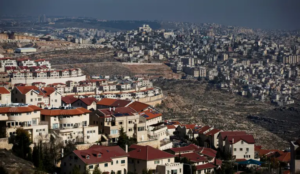JNF plan to expand settlements could ‘endanger its existence’ Jewish groups warn

Aerial view of Efrat settlement with the Palestinian city of Bethlehem in the background in 2020
Allison Kaplan Sommer reports in Haaretz on 15 February 2021:
Warning bells are being sounded by world Jewry that a decision to formalize purchase of West Bank land to expand settlements by the Jewish National Fund will not only damage Israel’s international diplomatic relations but could also hurt its fundraising efforts to an extent that could endanger its very existence.
Mercaz Olami, the Zionist organization of the Conservative-Masorti movement, said in a sharply worded statement “opposing the move” that it “could irreversibly endanger KKL and our homeland.” Mercaz Olami, the political arm of Conservative Judaism, represents the movement in international Zionist institutions, including the board of directors of JNF, which is known in Hebrew as Keren Kayemeth LeIsrael.
Under the proposal unveiled last week and approved by JNF leadership on Sunday, the organization’s policy would be officially changed so as to allow it to purchase West Bank land for the benefit of the Jewish settlement enterprise. The proposed decision, the statement said, “places KKL in a situation which potentially violates international law” and as such, it said, it could “harm” the Jewish communities in the 55 countries with JNF fundraising branches.
In many of these countries, the statement added, “raising funds that will be invested in disputed areas is strictly prohibited. An irresponsible decision could severely damage KKL’s ability to continue operating in these countries.”
”The current action attempts to impose a structure that reflects and favors the settlement policy of Israel’s extreme right, an act which is inconsistent with what has been a basic tenet of KKL throughout its history,” the group added, calling for a return to what it said had been the group’s previous policy of “Zionist consensus.”
Mercaz Olami joins opposition to the move from other Jewish groups in the Diaspora. Rabbi Rick Jacobs, president of the Union for Reform Judaism, declared after the plan was introduced that his movement “intends to mobilize the Jewish community to fight JNF’s plan through political and legal channels.”
Jacobs said that his organization, like the majority of American Jews, “have long opposed the proliferation of settlements because they endanger the possibility of a two-state solution,” and vehemently opposed JNF’s plan.
Opposition of Diaspora Jews to the move is significant because many of their organizations sit on the JNF Board of Directors, which will ultimately have the final say on the controversial shift in policy. These groups include representatives of branches of the Reform and Conservative movements Hadassah, WIZO, Maccabi World Union, B’nei Brit and NA’AMAT International.
Sunday’s decision to defer the board’s final decision on the matter until after Israel’s March 23 election followed threats by several members of JNF leadership to resign, in addition to a request from Kahol Lavan leader and Defense Minister Benny Gantz to postpone it.
Mercaz Olami vowed that their representatives “will persevere in their opposition to the proposed changes” as they currently stand.
In its current form, the proposal allows JNF to buy privately owned West Bank land, with priority given to land within settlements, land where construction is expected to face few obstacles and land adjacent to existing settlements that can be used for their expansion.
The proposal gives priority to land in the Gush Etzion settlement bloc, the Jordan Valley, areas surrounding Jerusalem, the Binyamin region north of Jerusalem, the South Hebron Hills, and areas adjacent to the pre-1967 border.
Alon Tal, JNF Deputy Chair and a representative of Kahol Lavan, predicted that the deep concerns of Diaspora groups on the board of directors will ultimately lead to substantive changes to the plan.
He told Haaretz that he foresees a compromise between the group’s ideologically right-wing leadership that developed the original proposal and more “moderate forces” on the board of directors.
Tal characterized Sunday’s decision to delay the board vote until after the election as a “gesture of good will” by the group’s top leadership, which would have liked to move forward with their plan more rapidly. Ultimately, he said, the delay will “buy time” in order to allow the “more moderate members” of the board to work with the leadership to accept a more unifying position which, he hopes, won’t compromise Israel’s international standing nor jeopardize the group’s support from Jews around the world. “I don’t think that anyone on the board believes that JNF land purchases are going to meaningfully change the map of any future territorial agreement. Those days are behind us” said Tal.
And while he said that he “understands” the desire of right-wing parties to show solidarity with West Bank settlers, he said he “knows that they are cognizant of the damage that could be done to JNF affiliate organizations and the many dedicated supporters living around the world who have been such exceptional partners over the years.”
This article is reproduced in its entirety
